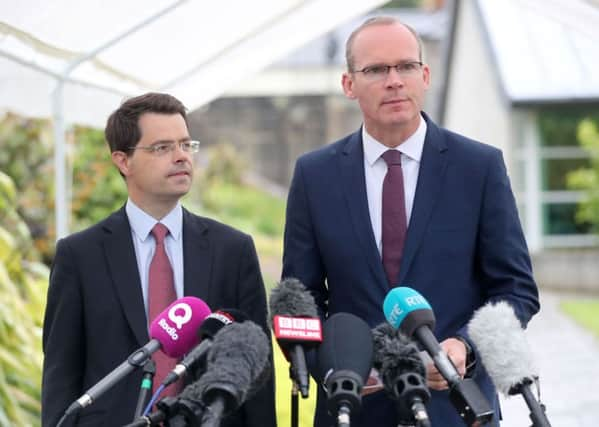Unclear what Brokenshire will do as deadline is missed


Despite Secretary of State James Brokenshire having warned of “profound and serious implications” if they missed the deadline, there has been no move to immediately implement direct rule.
Instead, Mr Brokenshire is not planning to make a statement on the issue until Monday when he will address the House of Commons.
Advertisement
Hide AdAdvertisement
Hide AdThe DUP and Sinn Fein gave a somewhat muted public reaction to the deadline passing and are expected to remain in contact over the weekend.
Last night Alliance deputy leader Stephen Farry highlighted that Northern Ireland is now more than three months into an unprecedented period in which, for the first time in the 96-year history of the Province, there is no democratic control of government decisions.
Yesterday’s statutory deadline was arbitrary, having been set by Westminster legislation taken through the Commons after the last deadline was sailed past.
If there is agreement before Monday’s non-statutory deadline, it would require fresh legislation in Westminster (something which would be a formality) to allow the formation of an Executive.
Advertisement
Hide AdAdvertisement
Hide AdA Downing Street spokeswoman said the passing of Thursday’s 4pm deadline “does not mean the efforts to restore the executive are ending”.
“We are now allowing the parties space to continue the discussions,” she said.
In the absence of agreement, the options open to Mr Brokenshire include setting another statutory deadline for the talks process, calling a second snap Assembly election or reimposing some form of direct rule from London.
The DUP and Sinn Fein, the two parties whose agreement is required to form a new administration, have accused each other of refusing to give ground on key issues.
Advertisement
Hide AdAdvertisement
Hide AdDespite a pessimistic mood at Stormont, the Downing Street spokeswoman insisted “very good progress” had been made in the talks.
“We believe a resolution can be found and we are urging the parties to continue focusing their efforts on achieving it,” she said.
A crucial sticking point in the way of a deal appears to be Sinn Fein’s demand for an Irish language act, which would bestow official protections for Irish speakers.
The DUP is willing to legislate on the language issue, but only if Ulster Scots speakers are included in any act, a condition Sinn Fein has rejected.
Advertisement
Hide AdAdvertisement
Hide AdThe 4pm deadline was the fourth deadline since the institutions collapsed in January.
Senior DUP negotiator Edwin Poots said if a deal did not materialise in the near future he would prefer direct rule ministers to take over running Stormont departments.
“The talks are continuing, obviously there is not going to be a breakthrough that would lead to nominations taking place today,” the Lagan Valley MLA said.
“The talks will continue, Sinn Fein know what they need to do.”
Advertisement
Hide AdAdvertisement
Hide AdHe added: “At this stage we aren’t close to an agreement, there is considerable work to be done and we believe the ball is in the court of Sinn Fein in the main in dealing with a series of outstanding issues.”
However, Sinn Fein insisted the DUP had to move, claiming it was “make up your mind time” for the unionists.
Sinn Fein’s Conor Murphy said “limited progress” had been made to bridge the gaps.
“In our view it’s now make up your mind time for the DUP,” he said.
Advertisement
Hide AdAdvertisement
Hide Ad“We have always said this can be done in a matter of hours, the issues are very clear, there are still gaps in terms of trying to establish a rights-based approach to these institutions working, as per the Good Friday Agreement.
“We want to close those gaps. There has been some limited progress in closing those gaps. We want to get this done, we want to get it done quickly and on a sustainable basis.”
Earlier, Mr Brokenshire and Dublin’s Foreign Affairs Minister Simon Coveney insisted a deal was “possible and achievable”.
Delivering a joint statement at the talks venue at Stormont Castle, they gave no firm indication on the way ahead once the deadline passed. Mr Brokenshire said a number of issues remain outstanding.
“I believe a resolution can be found,” he said.
Advertisement
Hide AdAdvertisement
Hide Ad“And I’m urging the parties to continue focusing all of their efforts on achieving this. The UK government will work with the parties toward their critical objective of forming an executive.
“But I’ve made clear to party leaders that it is for them to reach agreement.”
Mr Brokenshire added: “That prize remains achievable and remains my focus.”
Mr Coveney said the last three days of talks had been intensive and he was encouraged by the discussions.
Advertisement
Hide AdAdvertisement
Hide Ad“There still remain gaps to be bridged on some key issues,” he said.
“Like the Secretary of State I believe that an agreement is still within reach, an agreement that would allow a powersharing executive to be formed on a sustainable basis.”
Mr Coveney said all parties were committed to the successful operations of all the political institutions in Belfast and everyone was convinced devolution was the best way to deliver for the people of Northern Ireland.
“With courage and goodwill this can be achieved and everybody here is continuing to focus on a positive outcome,” he said.